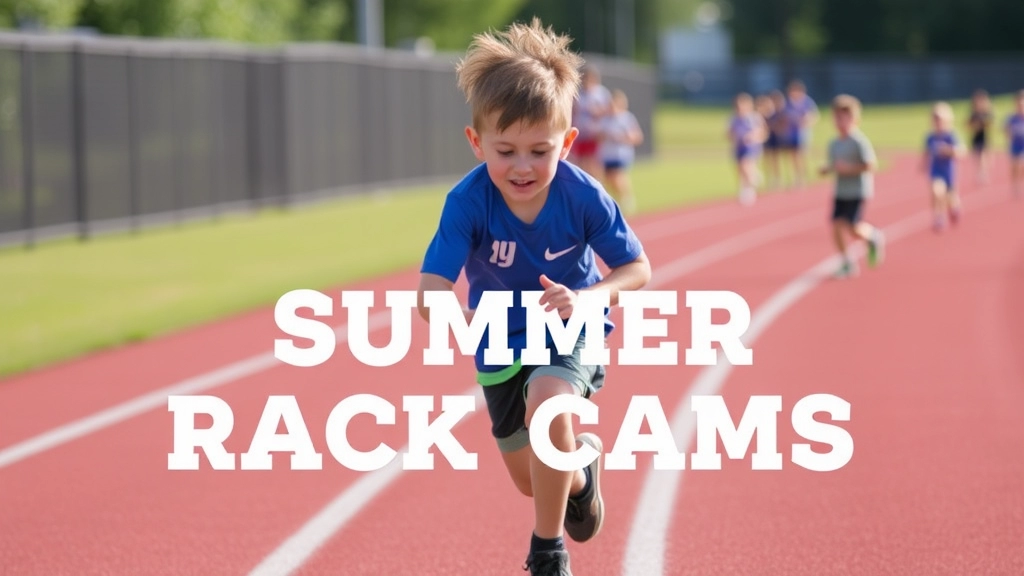Elevate Your Athletic Prowess This Summer
Looking to elevate your athletic prowess this summer? Summer track camps offer a unique blend of intensive training, expert coaching, and camaraderie among like-minded athletes. From residential to day camps, elite to specialty programs, there’s a camp tailored to every need and skill level. In this article, we’ll explore the types of summer track camps, the myriad benefits they offer, and how to choose the right one for you.
Key Features of Top Track Camps
We’ll also delve into the key features of top track camps, including their training programs and schedules, cost and registration details, and real-life testimonials. Plus, get tips on how to prepare effectively for camp, answers to frequently asked questions, and insights into future opportunities and progression paths post-camp.
Who Can Benefit?
Whether you’re a budding sprinter or a seasoned long-distance runner, this guide will help you make an informed decision and maximize your summer training experience.
Types of Summer Track Camps
Alright, let’s dive straight into it. You’re thinking about summer track camps, right? Maybe you’re wondering, “What’s the best fit for me?” or “Will it really help me improve?” Trust me, I’ve been there. Let’s break it down.
Residential Camps
First up, residential camps. These are the full-on, immersive experiences where you eat, sleep, and breathe track. You’re on-site, usually at a university or specialised facility. The big win here is the focus. You’re surrounded by coaches, athletes, and resources 24/7. It’s like boot camp but for track.
Pros:
- Intensive training: Non-stop focus on improving your skills.
- Networking: Meet and train with top athletes and coaches.
- Facilities: Access to high-end training gear and tracks.
Cons:
- Cost: These can get pricey.
- Time commitment: You’re there for a week or more, no breaks.
Day Camps
Next, let’s talk day camps. These are perfect if you want to keep your evenings free or if you’re not ready to commit to a residential camp. You show up in the morning, train hard, and head home by dinner.
Pros:
- Flexibility: Great if you have other summer plans.
- Cost-effective: Generally cheaper than residential camps.
- Local: No need to travel far from home.
Cons:
- Limited time: Less training time compared to residential camps.
- Less immersive: You miss out on the 24/7 track environment.
Elite Camps
Then there are the elite camps. These are for the serious athletes aiming for the top. If you’re looking to get noticed by college scouts or improve your chances of making a national team, this is where you want to be.
Pros:
- High-level coaching: Learn from the best in the business.
- Exposure: Get seen by scouts and recruiters.
- Advanced techniques: Focus on the finer details of your performance.
Cons:
- Selective: You might need to qualify to get in.
- Pressure: High expectations can be stressful.
Specialty Camps
Lastly, we have specialty camps. These focus on specific events or skills. Whether you’re a sprinter, distance runner, or field event specialist, there’s a camp tailored just for you.
Pros:
- Focused training: Hone in on your specific event.
- Expert coaches: Learn from specialists in your area.
- Skill development: Perfect for mastering techniques.
Cons:
- Niche: Less variety in training.
- Availability: Fewer options compared to general camps.
Which Camp is Right for You?
So, how do you pick? Think about your goals, budget, and how much time you can commit. If you’re all-in and ready to train like a pro, a residential or elite camp might be your best bet. If you need flexibility, a day camp could be perfect. And if you’re looking to master a specific skill, go for a specialty camp.
Remember, the best camp is the one that fits your needs and helps you grow as an athlete. For more information, check out our guide on top track and field summer camps for athletes and explore the benefits and tips of top summer swim camps.
Benefits of Attending Track Camps
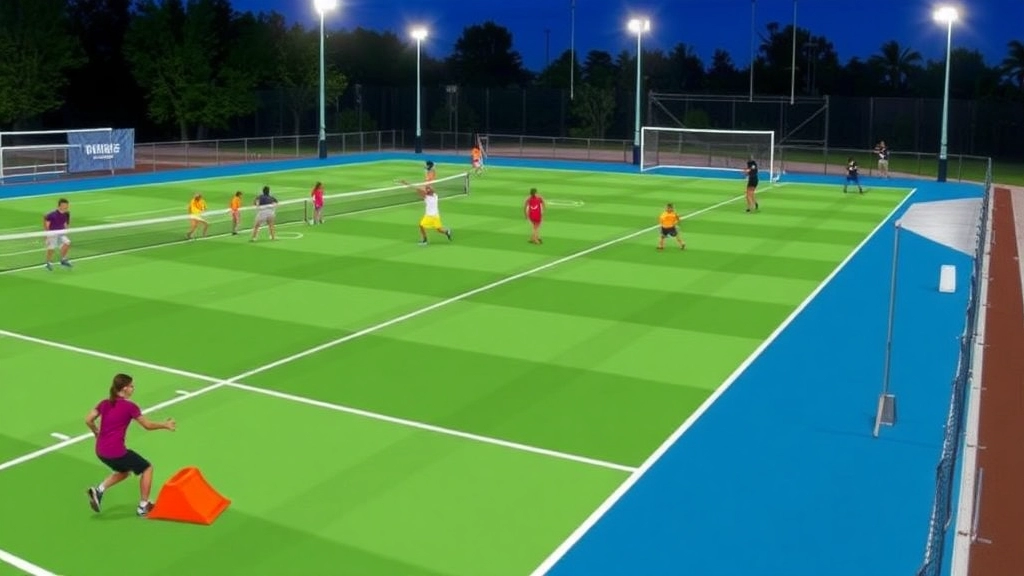
Thinking about joining a summer track camp but not sure if it’s worth it?
You’re not alone.
Many athletes wonder if these camps are just a money pit or if they actually provide real benefits.
Let’s break it down.
Why Attend a Track Camp?
Professional Coaching
- Expert Guidance: You get trained by professionals who know their stuff.
- Personalised Tips: Coaches give you feedback tailored to your needs.
Skill Improvement
- Technique Refinement: Fine-tune your running form and techniques.
- Strength & Conditioning: Focus on exercises that boost your speed and endurance.
Motivation & Inspiration
- Peer Support: Train alongside like-minded athletes who push you to do better.
- Success Stories: Hear from past campers who’ve gone on to achieve big things.
Networking
- Make Connections: Meet coaches and athletes who could be valuable contacts down the road.
- Future Opportunities: Get noticed for potential scholarships or team placements.
Fun & Enjoyment
- Engaging Activities: It’s not all work; there are fun activities to balance out the intense training.
- New Friendships: Build lasting relationships with fellow athletes.
Real Talk: Is It Worth It?
Absolutely.
Track camps offer a well-rounded experience that goes beyond just running.
You get better, faster, and stronger.
Plus, you leave with memories and connections that last a lifetime.
Quick Recap
- Professional Coaching
- Skill Improvement
- Motivation & Inspiration
- Networking
- Fun & Enjoyment
These benefits make attending a track camp a no-brainer.
How to Choose the Right Track Camp
Alright, let’s get real. Choosing the right track camp can feel like picking a needle out of a haystack. With so many options out there, how do you know which one’s the best fit? Let’s break it down so you can make a choice that sets you up for success.
What Are Your Goals?
First up, what are you aiming for? Are you looking to improve your sprinting speed, master the art of long-distance running, or maybe fine-tune your hurdling technique? Knowing your goals will help you zero in on the camps that specialise in what you want to achieve.
Camp Reputation and Reviews
You want a camp that’s got a solid rep, right? Look for camps with stellar reviews and testimonials. Check out what past attendees have to say. If they’re raving about the coaches and the training programmes, that’s a good sign. And don’t just take their word for itâdo a bit of sleuthing online to see if the camp has any accolades or partnerships with top athletes or organisations.
Coaching Staff
The quality of the coaching staff can make or break your experience. Top-notch coaches bring a wealth of knowledge and experience. Look for camps where the coaches have a proven track recordâmaybe they’ve trained Olympians or have high-level certifications. A great coach can offer personalised feedback that’s invaluable for your growth.
Facilities and Equipment
You don’t want to be training on a rundown track with outdated equipment. State-of-the-art facilities can make a huge difference in your training experience. Check if the camp has access to high-quality tracks, weight rooms, and recovery facilities. The better the equipment, the better your training sessions will be.
Training Programs
Look into the camp’s training programmes. Are they tailored to different skill levels? Do they offer a mix of technical drills, strength training, and mental conditioning? A well-rounded programme will ensure you’re improving in all aspects of your sport.
Camp Duration and Schedule
How long is the camp, and does it fit into your schedule? Some camps are weekend getaways, while others could be a few weeks long. Consider your availability and how much time you can commit. Also, check the daily schedule to see if it’s packed with value or just filler activities.
Location
Location matters. If the camp is too far away, travel costs can add up. Plus, being in a different time zone or climate can affect your performance. Choose a camp that’s convenient or at least one where the location adds valueâlike high-altitude training.
Cost
Let’s talk money. Track camps can be pricey, but don’t just go for the cheapest option. Weigh the cost against the benefits. Sometimes, paying a bit more for a top-tier camp can give you a better return on investment in terms of skills and experience.
Scholarships and Financial Aid
If the cost is a concern, check if the camp offers scholarships or financial aid. Some camps have programmes to help talented athletes who might not have the financial means to attend. Don’t let money be a barrier to your dreams.
Networking Opportunities
Finally, consider the networking opportunities. Camps that attract top talent and coaches can be a great place to make connections. These relationships can open doors for future opportunities, whether it’s college recruitment or professional training.
Checklist for Choosing the Right Track Camp
- Define your goals: Know what you want to achieve.
- Research reputation: Look for reviews and testimonials.
- Evaluate coaches: Check their credentials and experience.
- Inspect facilities: Ensure they have top-notch equipment.
- Review training programmes: Look for well-rounded schedules.
- Check duration and schedule: Make sure it fits your availability.
- Consider location: Factor in travel and climate.
- Compare costs: Balance price with benefits.
- Look for scholarships: Explore financial aid options.
- Network potential: Seek camps with strong networking opportunities.
Choosing the right track camp isn’t just about finding a place to train; it’s about finding a place that aligns with your goals and sets you on a path to success. Make your choice wisely, and you’ll be well on your way to smashing those personal bests.
For more detailed guides on various summer camps, check out our ultimate guide to boys and girls summer camps and explore the best summer camp activities to enhance your experience.
Key Features of Top Track Camps
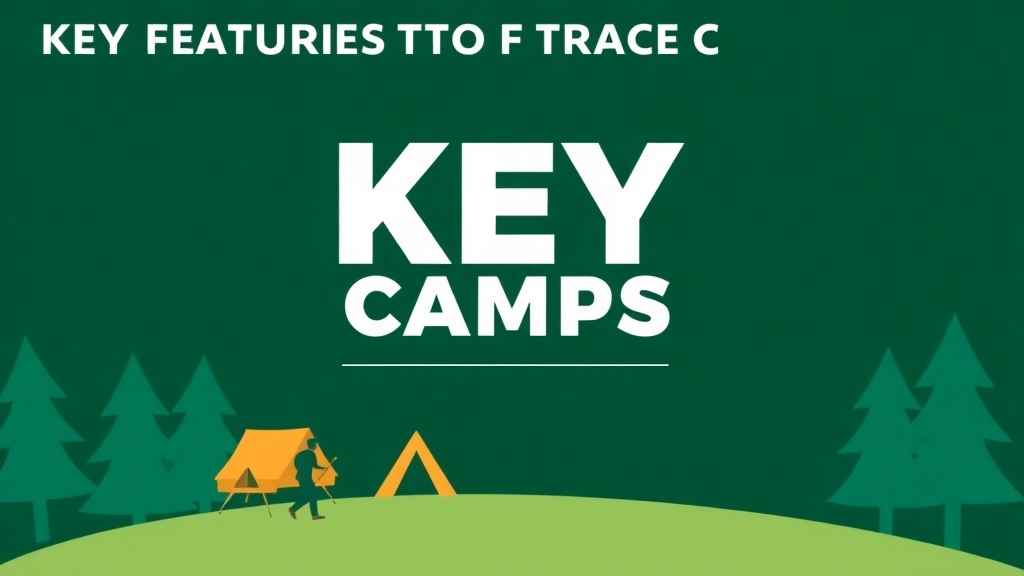
Ever wondered what makes a track camp stand out from the rest?
Let’s dive into the key features of top track camps.
Expert Coaching
Top track camps have coaches who know their stuff. We’re talking former Olympians, professional runners, and seasoned athletes.
- High-level experience: These coaches have been there, done that.
- Personalised feedback: They don’t just shout instructions; they give you tailored advice.
Cutting-Edge Facilities
You need the best to be the best, right?
- State-of-the-art tracks: Think Olympic-standard surfaces.
- High-tech equipment: From starting blocks to timing systems.
Comprehensive Training Programs
A great camp covers all the bases.
- Speed work: Focused sprints to boost your pace.
- Endurance training: Long runs to build stamina.
- Strength and conditioning: Gym sessions to make you stronger.
- Technique improvement: Drills to perfect your form.
Nutrition and Recovery
You can’t run well if you’re not fuelling and recovering properly.
- Diet plans: Tailored meal plans to keep you energised.
- Recovery sessions: Ice baths, massages, and stretching routines.
Community and Support
Top camps create a sense of belonging.
- Team spirit: You’re not just training; you’re part of a community.
- Motivation: Being around like-minded athletes pushes you harder.
Real-world Examples
Take John, for example. He joined a top track camp last summer.
- Before camp: Struggled with his 400m time.
- After camp: Shaved off 2 seconds and improved his form.
Easy Registration
No one likes a complicated sign-up process.
- User-friendly websites: Easy to navigate and register.
- Clear info: All the details you need, upfront.
Affordable Options
Quality doesn’t always mean expensive.
- Scholarships: Many camps offer financial aid.
- Early bird discounts: Save money by booking early.
Safety Measures
Especially important these days.
- Health protocols: Regular sanitisation and health checks.
- Supervision: Qualified staff to ensure everyone’s safe.
Training Programs and Schedules
Alright, so you’re thinking about diving into a summer track camp, but you’re probably wondering, “What exactly am I signing up for?” Let’s break it down. This section is all about the Training Programs and Schedules you’ll encounter at top-notch track camps. Trust me, getting a handle on this can make or break your experience. So, let’s get into it.
What Does a Typical Training Day Look Like?
First off, let’s talk about the daily grind. A lot of folks worry about whether they’ll be able to keep up or if the training will be too intense. Here’s the scoop: most camps design their schedules to be challenging but doable. You won’t just be running laps until you drop. Nah, it’s way more structured than that.
Morning Sessions:
- Warm-ups: Think dynamic stretches and light jogging to get the blood flowing.
- Skill Drills: Focus on techniqueâwhether it’s sprinting, hurdling, or long-distance running.
- Strength Training: Core workouts, weightlifting, and resistance exercises.
Afternoon Sessions:
- Cool-down: Stretching and recovery exercises to prevent injuries.
- Workshops: Sometimes, you’ll have seminars on nutrition, mental toughness, and strategy.
- Specialised Training: This could be anything from relay practice to high jump techniques.
Weekly Breakdown
A lot of camps run on a weekly schedule that mixes things up to keep you engaged and improving. Here’s a rough idea:
- Monday: Speed work and agility drills.
- Tuesday: Strength and conditioning.
- Wednesday: Technique-focused sessions.
- Thursday: Endurance training.
- Friday: Rest day or light recovery jog.
- Saturday: Competition simulations.
- Sunday: Review and strategy planning.
Customisation and Flexibility
One of the killer features of top track camps is the ability to customise your training plan. Maybe you’re a sprinter who needs to work on your starts, or perhaps you’re a long-distance runner aiming to improve your pace. Good camps offer tailored programs to fit your specific needs.
Personalised Coaching:
- One-on-One Sessions: Direct feedback and adjustments.
- Video Analysis: Breaking down your form and technique.
- Goal Setting: Setting and tracking personal milestones.
Real Talk: Can You Handle It?
Look, the training can be intense, but it’s designed to push you just enough to get better without burning you out. It’s all about balance. You’ll have downtime for recovery, and the coaches are usually pretty good at gauging when you need to dial it back.
Stories from the Track
Let me share a quick story. I remember this one camper, let’s call him Jake. He was worried about keeping up because he hadn’t trained much before. By the end of the first week, he was not only keeping up but setting personal bests. The structured schedule and targeted training made all the difference.
For more tips on making the most out of your summer camp experience, check out our guide to fun activities at summer camp and our daily schedule and safety tips.
Cost and Registration Details
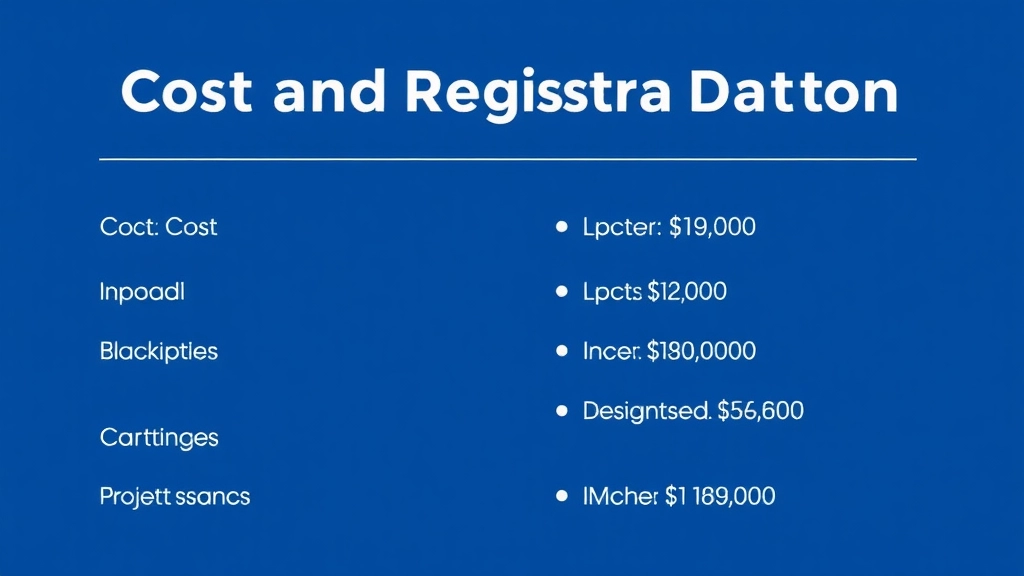
Alright, let’s get straight to it.
How much is this going to cost?
And how do you get signed up?
First off, the cost of summer track camps can vary widely.
But don’t worry, I’ve got you covered.
Let’s break it down:
Types of Fees
- Registration Fee: Most camps will have an upfront registration fee. This covers your spot and sometimes includes some basic gear.
- Camp Fee: This is the main cost. It usually covers coaching, facilities, and sometimes meals and accommodation.
- Additional Costs: Think travel expenses, extra gear, or special sessions.
Average Costs
- Day Camps: These can range from £100 to £500 per week.
- Residential Camps: Expect to pay between £500 and £1,500 per week.
Discounts and Scholarships
- Early Bird Discounts: Register early, save money.
- Group Discounts: Sign up with friends or teammates for a discount.
- Scholarships: Some camps offer financial aid. Don’t be shy, ask about it.
How to Register
Most camps have an easy online registration process. Here’s a quick rundown:
- Visit the Camp’s Website: Look for the registration tab.
- Fill Out the Form: Provide your details, emergency contacts, and any medical info.
- Payment: Pay the registration fee and any initial deposit.
- Confirmation: You’ll get a confirmation email with all the details.
Pro Tips for Registration
- Read the Fine Print: Check their refund policy.
- Stay Updated: Follow them on social media for updates and tips.
- Ask Questions: Don’t hesitate to call or email if you have any questions.
Real Talk
I know, spending money on a camp can feel like a big commitment.
But think of it as an investment in your future.
You’re not just paying for a week of fun.
You’re paying for skills, experiences, and memories that will last a lifetime.
And trust me, it’s worth every penny.
Final Thoughts
So, there you have it.
The lowdown on costs and how to get registered.
Ready to take the plunge?
Your future self will thank you.
Got more questions?
Check out our FAQ section or drop us a message.
See you on the track!
Testimonials and Success Stories
Why Listen to Testimonials?
Ever wondered if attending a summer track camp is worth it? You’re not alone. Many athletes and parents have the same question. So, let’s cut through the noise and get real about what people are saying. Testimonials and success stories can give you a genuine feel of what to expect. They offer insights that brochures and websites just can’t.
Real Stories, Real Impact
I remember chatting with a parent over coffee who was hesitant about sending her daughter to a track camp. She was worried about the cost, the time commitment, and whether it would actually make a difference. Fast forward to the end of the summer, her daughter not only improved her personal best but also gained a ton of confidence. That’s the kind of transformation we’re talking about.
What Do Past Attendees Say?
Here are some standout testimonials from athletes who’ve been there, done that:
- John, 16: “I was stuck in a rut with my training and wasn’t seeing any improvement. After attending the camp, I shaved off two seconds from my 400m time. The coaches were amazing, and I made friends for life.”
- Sarah, 14: “I was always nervous about competing, but the mental conditioning sessions at the camp really helped me overcome my fears. Now, I look forward to races instead of dreading them.”
- Coach Mike: “As a high school coach, I’ve seen firsthand how these camps can elevate an athlete’s performance. Several of my students have gone on to win state championships after attending.”
Success Stories: The Proof is in the Pudding
Here’s the deal: success stories are more than just feel-good tales. They’re proof that these camps work. Take, for instance, Emma, who attended a top track camp last summer. She was an average runner, but with the specialised training and expert guidance, she broke her school’s 800m record. Now, she’s eyeing a spot on the national team.
Or consider Liam, who was struggling with technique. After a week at camp, he not only improved his form but also got scouted by a university coach. These aren’t just isolated incidents; they’re happening all the time. For more insights on the benefits of summer camps, check out our guide on summer camp costs.
Tips for Preparing for Track Camp
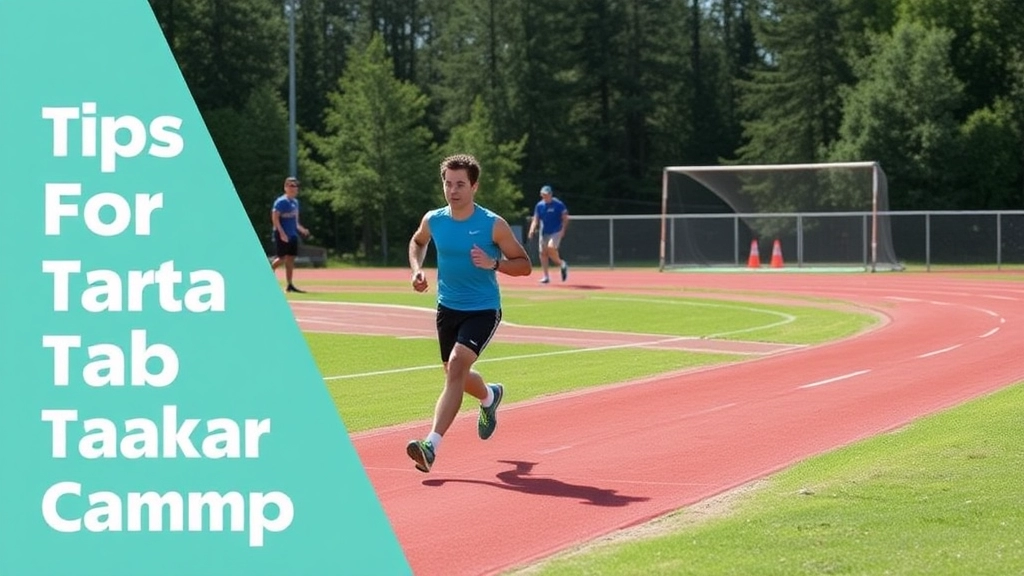
Are you worried about how to get ready for track camp?
I get it.
It’s a big step, and you want to make the most of it.
Let’s dive into some simple tips to help you prepare.
Get the Gear Right
First things first, you need the right gear.
- Running Shoes: Invest in a good pair that fits well.
- Clothing: Lightweight, breathable materials are key.
- Extras: Think water bottle, sunscreen, and a hat.
Build Your Fitness Base
You don’t want to show up out of shape.
- Start Running Now: Easy runs, a few times a week.
- Strength Training: Core and leg workouts help.
- Flexibility: Stretching is your friend.
Set Clear Goals
Why are you going to track camp?
- Improve Speed? Focus on sprinting drills.
- Endurance? Long runs and pacing.
- Technique? Work on form and efficiency.
Mental Preparation
Track camp is as much mental as it is physical.
- Visualisation: Picture yourself succeeding.
- Mindfulness: Stay present and focused.
- Stay Positive: Embrace challenges as growth opportunities.
Stay Informed
Do your homework.
- Camp Schedule: Know what to expect each day.
- Coaches: Learn about their backgrounds.
- Facilities: Familiarise yourself with the venue.
Packing Checklist
Don’t leave it to the last minute.
- Essentials: ID, insurance info, any medical needs.
- Comfort Items: Favourite snacks, a good book.
- Tech: Phone, charger, maybe a fitness tracker.
Connect with Others
You’re not alone in this.
- Join Forums: Chat with fellow campers online.
- Social Media: Follow the camp’s pages for updates.
- Buddy System: Find a friend to attend with you.
Frequently Asked Questions about Track Camps
Alright, let’s dive into the nitty-gritty of track camps. You’ve got questions, and I’ve got answers. This section is all about clearing up those common concerns and giving you the lowdown on what to expect. We’re talking real talk, no fluff.
What Exactly Is a Track Camp?
A track camp is essentially a dedicated programme designed to improve your track and field skills. Whether you’re a sprinter, a long-distance runner, or a field event specialist, these camps offer tailored training to help you hit your goals.
Who Can Attend a Track Camp?
Anyone with a passion for track and field can attend. Most camps cater to a range of skill levels:
- Beginners: Newbies looking to get a solid foundation.
- Intermediate: Those who have some experience and want to up their game.
- Advanced: Athletes aiming to refine their technique and break personal records.
What Should I Bring to Track Camp?
Here’s a quick checklist:
- Running shoes: Essential for all that track work.
- Spikes: If you have them, bring them.
- Comfortable clothing: Think breathable and flexible.
- Water bottle: Hydration is key.
- Snacks: Energy bars, fruits, anything to keep you fuelled.
- Notebook: For jotting down tips and feedback.
How Long Do Track Camps Usually Last?
Track camps can range from a weekend to a full week or even longer. It depends on the programme and your personal schedule.
What Kind of Training Will I Get?
Expect a mix of:
- Technical drills: To improve form and efficiency.
- Strength training: To build muscle and endurance.
- Speed workouts: To get you faster and more explosive.
- Strategy sessions: To refine race tactics and mental toughness.
Are Track Camps Expensive?
Costs can vary widely. Some camps are pretty affordable, while others, especially those with high-profile coaches, can be pricier. Always check what’s included in the fee:
- Accommodation
- Meals
- Training sessions
- Access to facilities
Can I Get Personalised Coaching?
Many top track camps offer one-on-one coaching sessions. This is a great opportunity to get tailored advice and feedback specific to your needs.
Will I Make Friends?
Absolutely! Track camps are a fantastic way to meet like-minded individuals who share your passion. It’s not just about the training; it’s about building a community.
What If I’m Nervous About Attending?
Totally normal. Everyone starts somewhere, and the camp environment is usually super supportive. Plus, stepping out of your comfort zone is where growth happens.
How Do I Register?
Most camps have an online registration process. It’s usually straightforward:
- Visit the camp’s website.
- Fill out the registration form.
- Pay the registration fee.
- Receive confirmation and additional details.
What’s the Next Step After Track Camp?
After you’ve soaked up all that knowledge and training, it’s time to apply what you’ve learned. Keep practising, set new goals, and maybe even consider joining a local track club for ongoing support and competition.
Got more questions? Don’t hesitate to reach out to the camp organisers or check out their FAQ section. They’re there to help you make the most of your experience.
For more information on summer camps, check out our Ultimate Guide to Kids Summer Camps and our tips on keeping your camper cool in summer.
Future Opportunities and Progression Paths
Ever wondered, âWhat’s next after a summer track camp?â
I get it. You’re excited but also a bit anxious.
No worries, mate. Let’s break it down.
The Big Question: What’s Next?
You’ve smashed it at track camp. Now what?
Here’s the deal:
Attending a track camp opens doors. Big ones.
School and University Teams
- Scouted by Coaches: Coaches love track camps. They scout for talent.
- Scholarships: Nail it, and you could land a scholarship. Imagine that! Learn more about summer camp scholarships.
Regional and National Competitions
Next, think bigger.
- Regional Meets: Start with local competitions. Build your rep.
- National Championships: With enough wins, you’ll get invites to nationals.
Professional Track and Field
Dreaming of going pro?
- Sponsorships: Big brands look for rising stars. You could be one.
- Professional Meets: Compete with the best. Travel the world.
Coaching and Mentoring
Not just running. You can give back too.
- Assistant Coach: Start coaching younger athletes.
- Mentorship: Guide newbies. Share your journey. Discover more about coaching and mentoring opportunities.
Fitness and Health Industry
Track skills are gold in the fitness world.
- Personal Trainer: Use your expertise to train others.
- Fitness Influencer: Share tips, build a brand.
Real Stories, Real Success
Let’s keep it real.
Take Jess, a camp alum. She landed a uni scholarship and now competes nationally.
Or Tom, who turned his camp experience into a coaching career.
Your Next Steps
So, what should you do now?
- Set Goals: Short-term and long-term.
- Network: Stay in touch with coaches and fellow athletes.
- Keep Training: Don’t stop. Keep improving.
FAQs about Summer Track Camps
What are the benefits of attending a summer track camp?
Attending a summer track camp offers numerous benefits including professional coaching, skill improvement, motivation and inspiration, networking opportunities, and a chance to have fun while making new friends.
Why should I consider joining a track camp?
Track camps provide expert guidance from professional coaches, personalised tips, and a structured environment to improve your running techniques, strength, and conditioning. They also offer a motivational atmosphere with peer support and success stories.
What makes a top track camp stand out?
Top track camps feature expert coaching from former Olympians and professional runners, cutting-edge facilities, comprehensive training programs, nutrition and recovery plans, and a strong sense of community and support.
How much do summer track camps typically cost?
The cost varies widely. Day camps can range from £100 to £500 per week, while residential camps can cost between £500 and £1,500 per week. Additional costs may include travel expenses and extra gear.
Are there any discounts or scholarships available?
Yes, many camps offer early bird discounts, group discounts, and scholarships. It’s a good idea to inquire about these options when considering a camp.
How do I register for a track camp?
Most camps have an easy online registration process. Visit the camp’s website, fill out the registration form, pay the required fees, and you’ll receive a confirmation email with all the details.
What should I do to prepare for a track camp?
To prepare for a track camp, ensure you have the right gear such as good running shoes and breathable clothing. Build your fitness base with regular running, strength training, and flexibility exercises. Set clear goals, mentally prepare, and stay informed about the camp schedule, coaches, and facilities.
What should I pack for track camp?
Pack essentials like ID, insurance information, and any medical needs. Bring comfort items such as your favorite snacks and a good book. Don’t forget tech items like your phone, charger, and possibly a fitness tracker.
Is it worth investing in a track camp?
Absolutely. Track camps offer a well-rounded experience that goes beyond just running. They help you become better, faster, and stronger while providing memories and connections that last a lifetime. Think of it as an investment in your future.
How can I connect with other campers before attending?
You can join forums and social media groups related to the camp. Following the camp’s pages for updates and finding a buddy to attend with you can also enhance your experience.
What safety measures do track camps have in place?
Top camps implement health protocols such as regular sanitisation and health checks. They also ensure proper supervision with qualified staff to keep everyone safe.
References
-
5 Benefits of Attending a Running Camp
-
10 Reasons to Go to a Running Camp
-
Why You Should Attend a Summer Running Camp

